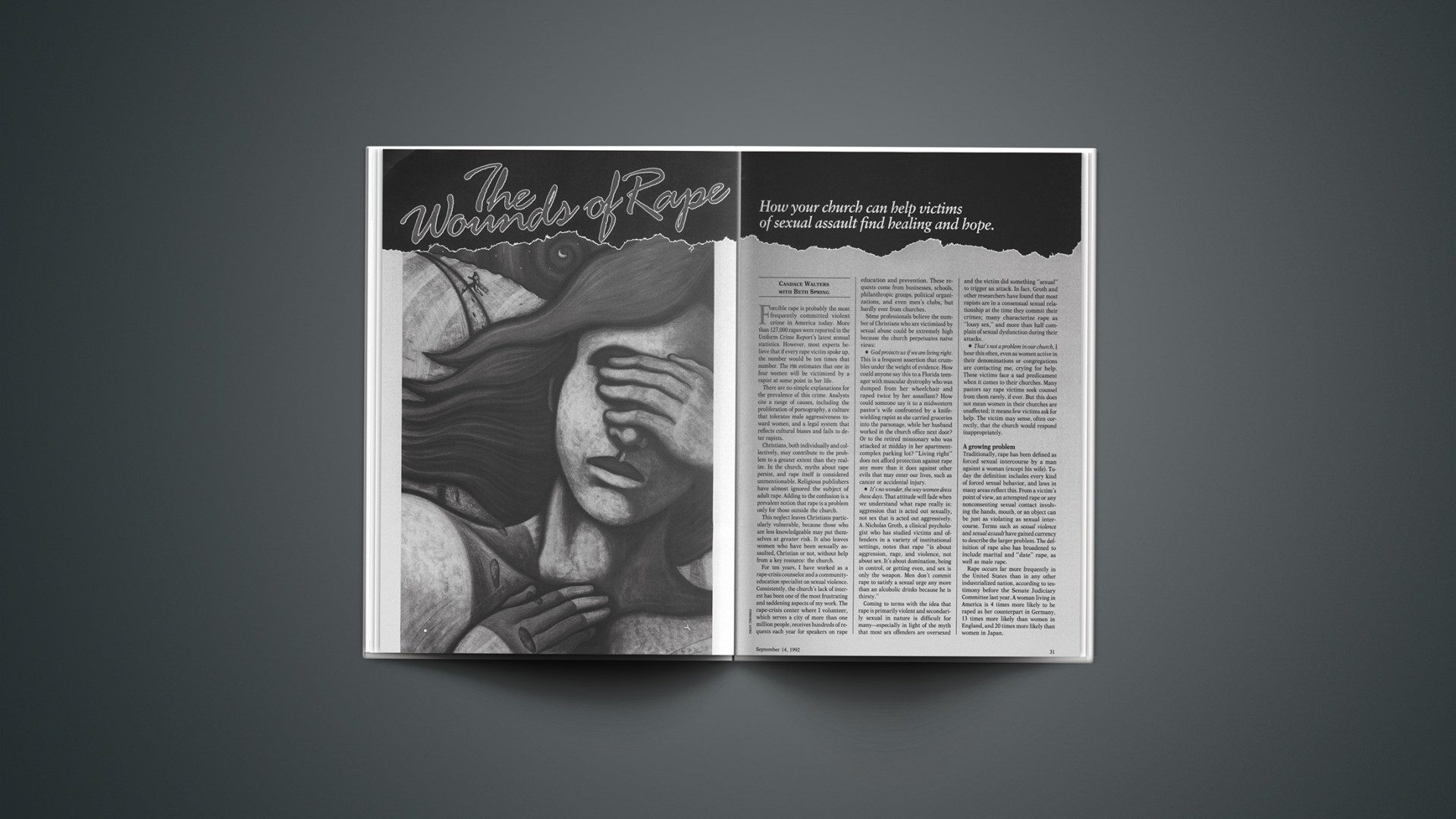How your church can help victims of sexual assault find healing and hope.
Forcible rape is probably the most frequently committed violent crime in America today. More than 127,000 rapes were reported in the Uniform Crime Report’s latest annual statistics. However, most experts believe that if every rape victim spoke up, the number would be ten times that number. The FBI estimates that one in four women will be victimized by a rapist at some point in her life.
There are no simple explanations for the prevalence of this crime. Analysts cite a range of causes, including the proliferation of pornography, a culture that tolerates male aggressiveness toward women, and a legal system that reflects cultural biases and fails to deter rapists.
Christians, both individually and collectively, may contribute to the problem to a greater extent than they realize. In the church, myths about rape persist, and rape itself is considered unmentionable. Religious publishers have almost ignored the subject of adult rape. Adding to the confusion is a prevalent notion that rape is a problem only for those outside the church.
This neglect leaves Christians particularly vulnerable, because those who are less knowledgeable may put themselves at greater risk. It also leaves women who have been sexually assaulted, Christian or not, without help from a key resource: the church.
For ten years, I have worked as a rape-crisis counselor and a community-education specialist on sexual violence. Consistently, the church’s lack of interest has been one of the most frustrating and saddening aspects of my work. The rape-crisis center where I volunteer, which serves a city of more than one million people, receives hundreds of requests each year for speakers on rape education and prevention. These requests come from businesses, schools, philanthropic groups, political organizations, and even men’s clubs, but hardly ever from churches.
Some professionals believe the number of Christians who are victimized by sexual abuse could be extremely high because the church perpetuates naïve views:
• God protects us if we are living right. This is a frequent assertion that crumbles under the weight of evidence. How could anyone say this to a Florida teenager with muscular dystrophy who was dumped from her wheelchair and raped twice by her assailant? How could someone say it to a midwestem pastor’s wife confronted by a knife-wielding rapist as she carried groceries into the parsonage, while her husband worked in the church office next door? Or to the retired missionary who was attacked at midday in her apartment-complex parking lot? “Living right” does not afford protection against rape any more than it does against other evils that may enter our lives, such as cancer or accidental injury.
• It’s no wonder, the way women dress these days. That attitude will fade when we understand what rape really is: aggression that is acted out sexually, not sex that is acted out aggressively. A. Nicholas Groth, a clinical psychologist who has studied victims and offenders in a variety of institutional settings, notes that rape “is about aggression, rage, and violence, not about sex. It’s about domination, being in control, or getting even, and sex is only the weapon. Men don’t commit rape to satisfy a sexual urge any more than an alcoholic drinks because he is thirsty.”
Coming to terms with the idea that rape is primarily violent and secondarily sexual in nature is difficult for many—especially in light of the myth that most sex offenders are oversexed and the victim did something “sexual” to trigger an attack. In fact, Groth and other researchers have found that most rapists are in a consensual sexual relationship at the time they commit their crimes; many characterize rape as “lousy sex,” and more than half complain of sexual dysfunction during their attacks.
• That’s not a problem in our church. I hear this often, even as women active in their denominations or congregations are contacting me, crying for help. These victims face a sad predicament when it comes to their churches. Many pastors say rape victims seek counsel from them rarefy, if ever. But this does not mean women in their churches are unaffected; it means few victims ask for help. The victim may sense, often correctly, that the church would respond inappropriately.
A Growing Problem
Traditionally, rape has been defined as forced sexual intercourse by a man against a woman (except his wife). Today the definition includes every kind of forced sexual behavior, and laws in many areas reflect this. From a victim’s point of view, an attempted rape or any nonconsenting sexual contact involving the hands, mouth, or an object can be just as violating as sexual intercourse. Terms such as sexual violence and sexual assault have gained currency to describe the larger problem. The definition of rape also has broadened to include marital and “date” rape, as well as male rape.
Rape occurs far more frequently in the United States than in any other industrialized nation, according to testimony before the Senate Judiciary Committee last year. A woman living in America is 4 times more likely to be raped as her counterpart in Germany, 13 times more likely than women in England, and 20 times more likely than women in Japan.
“American women are in greater peril now from attack than they have ever been in the history of our nation,” says the committee’s report, issued in May 1991. It also notes that rape has increased four times faster than the overall crime rate during the past decade. Depending upon where a rape is committed and reported, less than 40 percent of the offenders are arrested. Of these, only a few face conviction. The average offender commits 25 rapes before he is caught. While most people think rape by a stranger is typical, date or acquaintance rape now accounts for 60 percent of rapes reported to the police.
A Victim’S Pain
When a woman is sexually assaulted, it is as if the rapist takes a giant-sized garbage bag, fills it with filthy, rancid trash, and tells her to carry it for the rest of her life. Too often the survivor of rape does not know how to dispose of the emotional garbage the rapist has given her, so she drags the heavy, smelly burden with her everywhere. A sense of personal degradation may be overwhelming, as it was for rape victim Ellen Foster (not her real name).
What Churches Can—And Can’T—Do
A church can take a number of steps to help parishioners deal with rape. Some of the suggestions that follow may be especially fitted to a large church with multiple staff, but every church can and should become better informed, more sensitive, and more open to ministry opportunities among rape victims.
• Recognize that women in the church may be vulnerable because, as a whole, they are uninformed. Traditional Christian teachings that urge women to be meek and submissive can set women up for a rapist who looks for precisely these traits in a victim.
• Speak out against the sin of sexual violence from the pulpit. When a minister does not grant permission to mention rape in a church setting, not only is the victim slighted, the offender also goes unconfronted. Pastoral references can set the mood for proper attitudes and effective actions by the whole congregation. A Christian’s hope for healing should be a key theme, without implying that the process of recovery should be hurried.
• Include a female on the leadership team. It is crucial for women to be involved in establishing programs and making policies if a church desires to offer effective ministry in this area. If no lay or staff woman is available, consider asking a community educator in the field of sexual violence to act as a consultant.
• Create a group to study resources available in your community. A handful of concerned lay people could generate information for the whole congregation.
• Set up peer support groups. Rape survivors often feel isolated, especially in the church. They may think no one else has experienced what they went through. When women with similar experiences form a group to offer support to one another, it can make a tremendous difference in their recovery. A trained resource person should be consulted about starting such a group.
• Learn to recognize psychological characteristics of rape victims. Many survivors suffer a “silent rape reaction” while seeking counseling for other problems. They may never mention the assault itself. Instead, they may act out their trauma through suicide attempts, substance abuse, or eating disorders. Also, uninitiated physical contact may make them feel further violated, even if it comes in the form of a seemingly innocuous hug in church.
• Install and use security devices on church buildings. Often, women work at the church alone, but they neglect to secure the building because they feel safe in God’s house.
• Make sure someone on staff or in the church understands the basics of crisis intervention. Learn how to refer women who are traumatized to local rape-crisis centers, law-enforcement agencies, and medical facilities. Secondary victims, such as friends and relatives of the rape survivor, may also need support.
• Know your limits. Don’t attempt to counsel victims beyond the level of your expertise. Understand the difference between offering support and providing therapy. Never “bury” a reported rape or discourage a woman from involving authorities. At times, offenders appeal to pastors for absolution as a substitute for rehabilitative therapy or turning themselves in. This is extremely dangerous. Pastoral assistance to a rapist should be an addition to expert help, not a substitute for it.
• Keep confidences. As in all pastoral counseling, the information about a rape must remain privileged information. For pastors to speak to their spouses or other church leaders about it without the victim’s willing consent can be a devastating violation of trust.
• Provide a healing environment for survivors of sexual assault. Brothers and sisters in Christ have a unique calling and God-imparted capacity to offer support, guidance, and spiritual hope. We need Spirit-filled men and women who are not afraid to walk into the hellish lives of rape victims, supporting them with prayer, understanding, and informed recommendations on how to begin the healing process.
By Candace Walters and Beth Spring.
“The rapist left me in my darkened bedroom with duct tape wrapped tightly around my mouth, hands, and feet. I had never felt so horrified and helpless,” Ellen recalls. “It took me about half an hour to struggle down my porch steps and hobble across the wet lawn to the house next door. By the expression on my neighbor’s face, I knew I looked awful. I was too upset to tell him I’d been raped, so I said I was just robbed.”
Because of the circumstances, her rape received national news coverage. Ellen, principal percussionist for a major city’s orchestra, had been listed in a magazine as one of the city’s ten most eligible women. A convicted rapist who had just been released from prison saw the list and accepted a dare to rape all ten women. Ellen was his first victim. As she sought help in the aftermath of her rape, she found the church to be poorly informed and largely unprepared.
“It is hard for any woman to say that she has been raped,” says Ellen. “There is such a stigma attached to it. It is even harder for a victim who is a Christian. For one thing, rape is rarely mentioned within the church. If a woman does mention it, help within the Christian community is practically nonexistent. Many times it is not only the rape that devastates a woman, it is the reaction of others who hear what happened to her. Most victims remain silent or anonymous because they rightly fear they will be misunderstood or judged.”
Members of the clergy who are asked about their preparedness regarding sexual assault tend to confirm Ellen’s observations. One Baptist pastor summarized his feelings, saying, “It’s not that I don’t want to help rape victims—I just don’t know how. It’s a unique counseling situation that we never learned about in seminary. I would have to refer her to a specialist whom I would have to take time to investigate. Ideally, it would be better to help her within the church family, but I know of only a few churches nationwide that provide this service.”
A pastor may be a good source of spiritual comfort, but many lack the time or training to provide adequate, long-term counseling to a rape survivor. “Any clergy-person or religious professional encountering an episode or situation of sexual assault or abuse meets a reality that tries the limits of our emotional and theological resources,” states the Reverend Patricia Wilson-Kastner in Sexual Assault and Abuse: A Handbook for Clergy and Religious Professionals. This makes referral all the more important an option. Pastors may hesitate to refer because most victim-assistance programs and literature have been initiated by feminists, but they still may offer great help.
Hurting, Not Helping
What happens when a rape victim does seek solace from her church community? Unfortunately, her pain may intensify. I have talked with dozens of victims who felt more deeply injured by the attitudes of their congregation than by the assault itself. Elizabeth was asked to stop teaching Sunday school after she was sexually attacked by a neighbor, because she was no longer “a good role model” for children. Diane was assaulted by a customer at her place of employment and then blamed by her church elders, who felt women should not work outside the home.
Sarah endured years of abuse from her husband, because her pastor told her there is no such thing as marital rape. Kelly was date raped at gunpoint by a police-academy recruit who appeared to be an exemplary young man at church. The pastor and board urged her not to press charges since it would embarrass both prominent families, and besides, it was “her word against his.”
Despite widespread media attention and reformed laws, sexual assault remains an ambiguous issue in our society. Those who are sympathetic consider the rape victim pitiful or disturbed. Those who are more critical see her as promiscuous or contaminated.
Unlike any other victim of a violent crime, a woman who is raped finds herself categorized as stupid or a failure. People tend to forget that rape is caused by the rapist—not the victim. Would we dream of asking the victim of a hit-and-run accident what he was doing in that part of town? Or asking a burglary victim why he brazenly tempted his assailant with such an attractive television set? The most important reason why a woman is targeted by a rapist is her vulnerability, not her sexiness.
Take Ellen Foster’s case. The man who assaulted her broke into her home while she rehearsed with the orchestra. As he waited for Ellen to return, he amused himself by playing with her large collection of musical instruments. He unscrewed the lightbulb in her bedroom. After his arrest, he admitted to a policeman that as he crouched in the darkness, he had planned how he would humiliate, violate, and punish a woman he had never met.
A court psychiatrist, after examining Ellen’s rapist, said he represented the most common type of offender, usually classified as a power rapist. He is a man who sees himself as inferior and a failure. He rapes so he can have status and significance, not for sexual outlet. Often the anger or aggression is not even intended for the victim herself, and the rapist cannot remember afterward what the woman looked like. Ellen’s attacker said he raped both women and men; it made no difference to him.
Ellen believes the church represents a natural resource for rape victims, if only it would recognize the truth about rape and equip itself appropriately. “Everyone must realize that, as hideous as rape is, it becomes worse if the victim thinks it is unspeakable and insoluble,” Ellen says. “The Christian community especially needs to make an impact in this area. Secular groups do not understand the need for God’s supernatural power in dealing with the aftermath of a sexual assault. I think it is essential for complete recovery.”
When people experience other sorts of life crises, they more easily reach out to receive needed support, compassion, and expressions of kindness. And when death, illness, or an accident strikes, friends and relatives respond instantly with cards, prayers, visits, telephone calls, and meals. In the case of rape, however, even if a victim asks for help, many people do not know how to react. Though they may mean well, they often respond in ways that compound the victim’s pain. Those who have not been raped cannot completely understand how a victim feels. Some may discount the seriousness of the assault. The woman may be offered platitudes and Bible verses that sound superficial. She may feel pressured to carry on as if everything is normal when, in actuality, her world has fallen apart.
A Healing Environment
The wounds of rape, like any other wounds, need a nurturing environment in which to heal (see “What Churches Can—and Can’t—Do,” p. 31). Women who feel isolated and misunderstood have a much harder time recuperating from a rape. If a Christian victim’s only alternative for help comes from secular resources, this may add to her guilt and sense of low self-worth, especially if she feels rape is a singularly unmentionable sin.
Christian leaders must work to break the silence and bring this taboo subject into the open. The church should not be one of the last places a victim looks for help after rape—it should be one of the first.










